Trying to keep your brain health in check is a no-brainer (pun intended). Since having a healthy brain is essential to our ability to communicate effectively, make decisions, and generally live an independent and productive life, it is no wonder why so many people are focused on keeping this key organ in tip-top shape.
A wide variety of factors can impact our brain health, and not all factors are within our control (we’re looking at you, age and genetics). But factors like our dietary choices may profoundly impact how our noggin fares as we go through the aging process.
Among the many diets out there, the MIND diet appears to be your best when choosing a diet pattern for supporting your brain health. As a combination of the Mediterranean and the DASH diet, this way of eating is rich in antioxidants, healthy fats, and a wide variety of micronutrients that may keep our noodles sharp. Plus, this diet limits fried food, red meat, cheese, and sweets.
Sure, eating blueberries, olive oil, and other foods included in the MIND diet is a fantastic idea if you are trying to support your brain health. But along with focusing on antioxidant-rich and anti-inflammatory foods, you may want to include eating foods rich in choline to your “to-do” list for doing all you can to keep your melon functioning properly because you may not be getting enough of this essential nutrient.
Choline—the brain-boosting nutrient many of us are not eating
Would you believe that a nutrient that is linked to cognitive health, DNA synthesis, a healthy pregnancy, and the body’s ability to remove cholesterol from the liver is only consumed in adequate amounts by approximately 10% of the US population?
Choline is an essential nutrient, meaning that your body can’t make it in adequate amounts; therefore, you need to get this nutrient from your diet or supplements. This B-like vitamin certainly hasn’t got its moment in the spotlight that it deserves, especially when it comes to how this nutrient can affect our brain health.
Choline is essential for the body’s process of producing acetylcholine, a neurotransmitter that impacts memory, temperament, and intellect. Adequate concentrations of choline in the brain are believed to protect against age-related cognitive decline and certain types of dementia, including Alzheimer’s Disease, possibly because having enough in the body may preserve neurons, brain volume, and neuronal transmissions.
In fact, results from a study published in the American Journal of Clinical Nutrition showed that, among a cohort of over 3,000 subjects, those who consumed more choline appeared to have a more profound reduced risk of developing Alzheimer’s Disease. According to this study, those who consumed the least amount of choline every day were significantly associated with an increased risk of developing dementia or Alzheimer’s Disease.
A different study evaluating over 2,000 people showed that low choline concentrations were associated with poor cognitive performance.
How much choline do we need?
Our choline needs can vary based on age, gender, and whether we are pregnant or lactating. From newborn babies to people well into their golden years, choline is one nutrient that continues to be important to consume throughout the lifecycle.
Here are the Adequate Intake (AI) levels for choline based on various ages, genders, and stages of the lifecycle, according to the National Institute of Health as measured in milligrams (mg).
- Birth to 6 months 125 mg/day
- 7–12 months 150 mg/day
- 1–3 years 200 mg/day
- 4–8 years 250 mg/day
- 9–13 years 375 mg/day
- 14–18 years 550 mg/day (M) 400 mg/day (F)
- 19+ years 550 mg/day (M) 425 mg/day (F)
- Pregnancy 450 mg/day
- Lactation 550 mg/day
Some of the best sources of choline include egg yolks, liver, beef, chicken, fish, and soybeans. Other foods, like cauliflower, peanuts, quinoa, and potatoes have this nutrient too, just not as large of quantities as the previously listed sources.
READ RELATED: Ilona Ylikorpi Height, Weight, Age, Body Statistics
You can stick to these natural sources of choline to help you meet your needs. But if you want a bit more hand-holding when combing the grocery aisles looking for a choline-packed snack or ingredient, read on to learn which items belong in your cart.
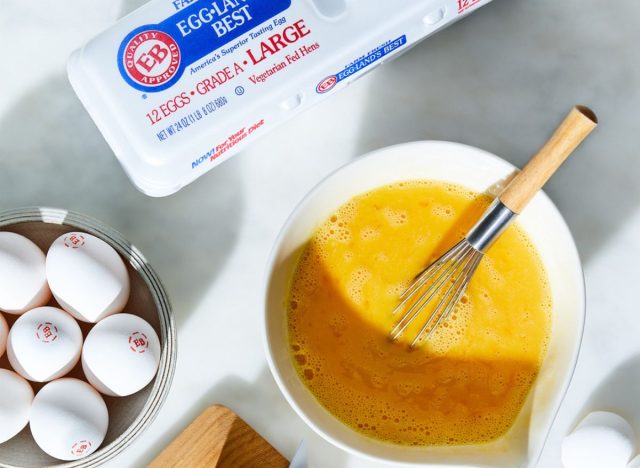

Eggs are one of the best sources of choline, with around 150 milligrams of this key nutrient per egg. Eggland’s Best eggs not only contain choline, but they also have double the omega-3s compared to ordinary eggs. And since omega-3 fatty acid intake is linked to improved brain health, including these eggs in your diet gives you a 1-2 punch in the brain health-support department. These eggs also contain 6 times more vitamin D and 10 times more vitamin E compared to ordinary eggs. Since both of these nutrients are linked to brain health too, opting for Eggland’s Best eggs is a no-brainer!
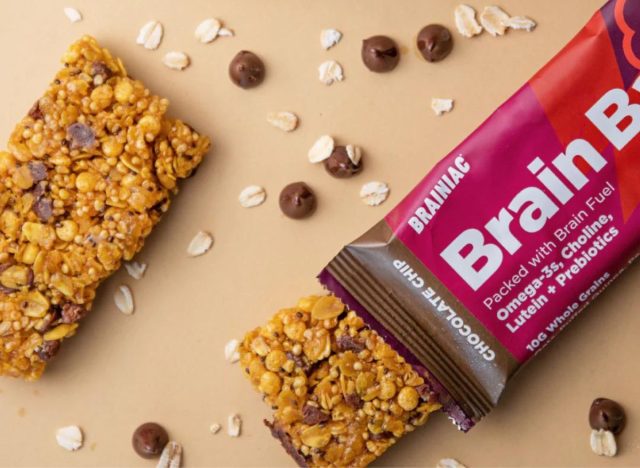

With 55 milligrams of choline per serving, this bar from Brainiac is a perfectly portable choline snack that is easy to nosh on during the day. But choline isn’t the only brain health-supporting nutrient in these bars. Each serving also contains 150 milligrams omega-3 fatty acids and 2 milligrams of lutein – two other nutrients that may help keep our brain health where we want it to be.
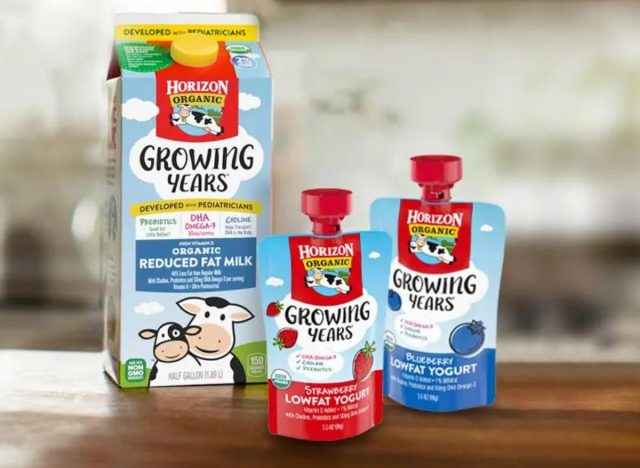

One cup of Horizon Growing Years provides 50 milligrams of cognitive health-supporting choline along with DHA and prebiotics to help little and grown-up minds be healthy. Plus, this milk is certified USDA organic and certified carbon neutral.
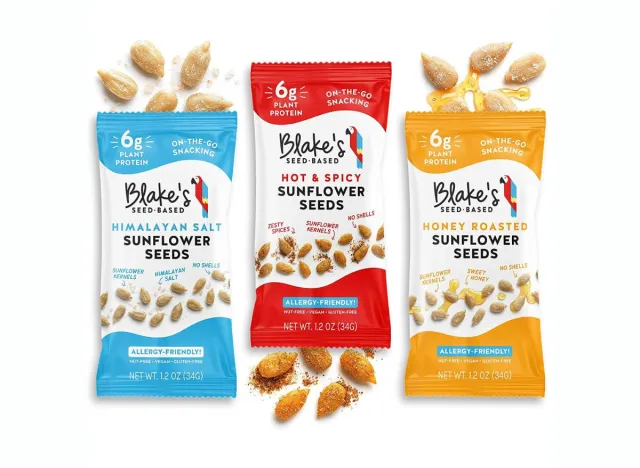

While sunflower seeds may not contain a large amount of choline, there is some in there! With a 1/4-cup serving of shelled sunflower seeds providing 19 milligrams of choline, including these tiny powerhouses in recipes and snacktime can help you meet your needs.
Blake’s Seed-Based Hot and Spicy Sunflower Seeds are sunflower seeds with a kick. And along with the choline, these seeds provide healthy fats, which may help support brain health too.
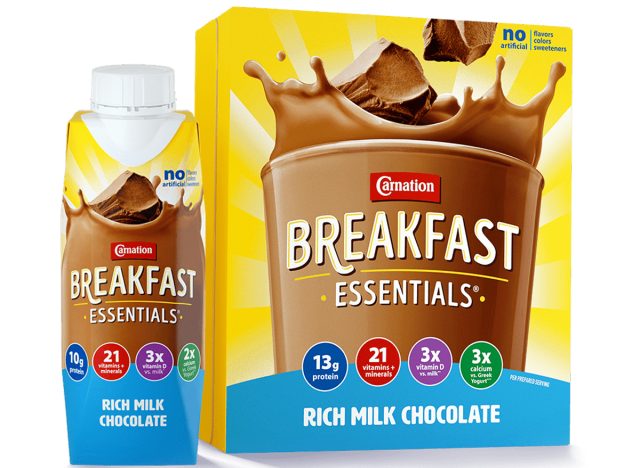

If you are a fan of enjoying breakfast on the go, you may already be familiar with Carnation Breakfast Essentials. With 60 milligrams of choline per serving along with other important brain health nutrients like iron, this sippable breakfast solution can help busy people get in some key nutrition early in the day.
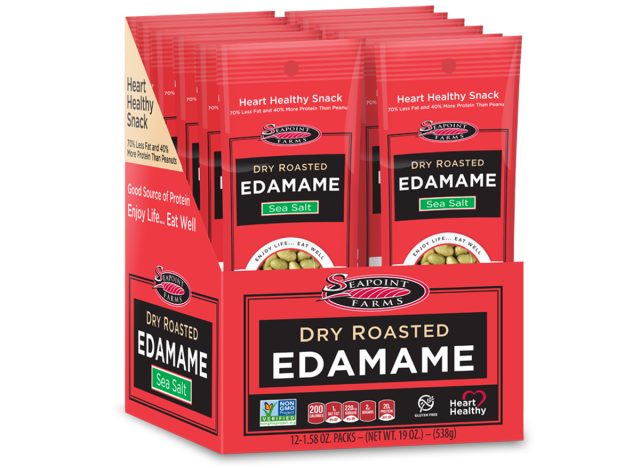

Soybeans are one of the best plant-based sources of choline, with 107 milligrams of this nutrient per 1/2 cup. Seapoint Farms Dry Roasted Edamame is a convenient snack that is made from real soybeans, allowing you to fuel your body and your brain in seconds.
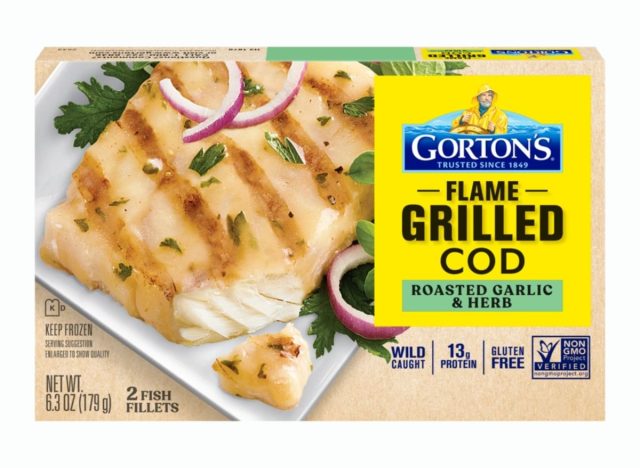

Three ounces of cod contains 71 milligrams of choline along with other key brain-health nutrients, including DHA omega-3 fatty acids. If you aren’t a cod cooking pro, leaning on this pre-marinaded dish can help you enjoy this nutrient-dense fish in a snap. Simply bake these frozen and marinated pieces of fish until they are cooked through, and enjoy with a side of cauliflower and red potatoes for even more choline on your plate.
Source:











